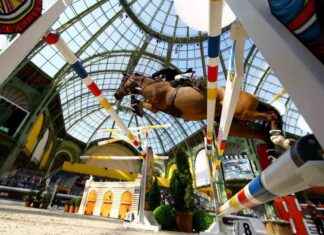The water vapor rises meters high from the cooling tower of the Isar 2 nuclear power plant in Essenbach near Landshut. A defining image in the region for decades. This should be over in a few months – actually. However, after Germany, like the whole of Europe, is heading towards an energy crisis due to only scanty gas supplies from Russia, Isar 2 and the other two remaining German nuclear reactors have long since been on everyone’s lips again – and are therefore also very popular with some politicians.
“We were in the core of the reactor,” said CDU leader Friedrich Merz when he stepped in front of the microphone on Thursday afternoon after visiting the Isar 2 nuclear power plant, together with CSU leader Markus Söder, Bavaria’s Economics Minister Hubert Aiwanger and State Minister for the Environment Thorsten Faithr (both free voters). All four politicians are united by the demand that the three German nuclear power plants Isar 2, Emsland in Lower Saxony and Neckarwestheim 2 in Baden-Württemberg continue to operate beyond the end of the year.
Not in the core of the reactor, of course
That’s exactly what they say to the waiting journalists one after the other – they weren’t allowed in the power plant, but of course the politicians didn’t visit the core of the reactor, as Merz says, but only the reactor building. A photo of the State Chancellery shows Söder and Merz there in white protective suits and yellow shoes.
The continued operation of the nuclear power plant is possible, said Söder. It was time to act to get through the winter well. “Every day counts.” From the point of view of the Union, the necessary legal changes for longer operating times of nuclear power plants would have to be decided by the Bundestag in August. If you take into account the ordering time for new fuel rods of up to 15 months, it is clear why it is so important to make decisions in August, says Merz. “If we are in September it will be critical, if we are at Christmas it is impossible.”
Merz emphasizes that the Union would be ready at any time to come together in the Bundestag for important decisions, even during the parliamentary summer break. “The operation of the nuclear power plant is technically, personally and legally possible.” Now it has to be decided whether this is also politically possible. Otherwise there will only be another session of the Bundestag in five weeks. “We could make decisions at this point in time” that would make continued operation possible beyond the turn of the year 2023/2024. “I call on the federal government to exhaust all possibilities,” says Merz. But it is not about wanting to return the old nuclear energy.
Not that easy
But as much as the Union – and also the FDP – would like longer terms and thus at least a postponement of the nuclear phase-out decided in Germany in 2011, it’s not that easy. A change in nuclear law must be decided in the Bundestag, and so far the federal government and the parties supporting it have made no attempt to rush. Chancellor Olaf Scholz (SPD) recently said that it might make sense not to switch off the reactors on December 31, but first the ongoing stress test had to be awaited. The aim is to find out which risks would have longer terms and which benefits. The results should be available in a few weeks.
For the Union, the question has long since been answered. With Isar 2, Merz speaks of “one of the most modern nuclear power plants in the world”, Söder of an energy emergency in Germany with an existential gas problem until mid-2024. In his opinion, it would be a “reasonable and good solution” to continue operating the nuclear reactors. This requires a long-term perspective and not just an extension of three months.
Security check has been missing for years
However, more and more critics of the longer running times are also speaking up in the debate: environmental organizations such as Greenpeace and the Bund Naturschutz (German Nature Conservation Union) have doubts about the safety of the reactors with a view to terrorist attacks and floods.
Ex-Federal Environment Minister Jürgen Trittin (Greens) even calls the politicians’ visit to the nuclear power plant “propaganda”. “If the TÜV Süd should determine that Isar 2 is secured against the crash of Merz’s small plane, then I would not contradict that. But that no longer applies to large commercial aircraft – as it does to all nuclear power plants,” he tells the editorial network Germany ( RND). Isar 2 has not had a security check for three years.
Speaking of security checks: A few hours after Söder, Merz and Co. have long since left and only a few journalists are still on site, a warning suddenly sounds from the loudspeakers: There is a lot of smoke in the power plant’s machine house, it must be cleared immediately.






